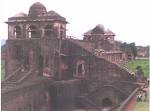Mohandas Karamchand Gandhi 1869 – 1948
July 26, 2009
 Mohandas Karamchand
Gandhi
1869 – 1948 was the pre-eminent political and spiritual leader of India
during the Indian independence movement.
Mohandas Karamchand
Gandhi
1869 – 1948 was the pre-eminent political and spiritual leader of India
during the Indian independence movement.
Gandhi was persuaded to try homeopathy by Motilal Nehru and Chittaranjan Das, and after his initial suspicion, he became a staunch advocate of homeopathy, (commenting before he had even tried it) ‘… Personally, I would prefer homeopathy anyday to allopathy. Only I have no personal experience of its efficacy… (Dana Ullman, _The Homeopathic Revolution: Why Famous People and Cultural Heroes Choose Homeopathy_.* (North Atlantic Books, 2007). Multiple pages. See also Shashi Tharoor, _Nehru: The Invention of India_, (Arcade Publishing, 2003). Page 37)…*’
And after Gandhi had experience of homeopathy, he exclaimed (from Chittaranjan Das 1950 All India Homeopathic Medical Conference 1968):
From Dana Ullman, _The Homeopathic Revolution: Why Famous People and Cultural Heroes Choose Homeopathy_.* (North Atlantic Books, 2007). Multiple pages) ’… *Homeopathy is the latest and refined method of treating patients economically and nonviolently. Government must encourage and patronise it in our country. Late Dr. Hahnemann was a man of superior intellectual power and means of saving human life, having a unique medical nerve. I bow before his skill and the Herculean and humanitarian labour he did.
His memory wakes us again and you are to follow him, but the opponents hate the existence of the principles and practice of homeopathy, which in reality cures a larger percentage of cases than any other method of treatment, and it is beyond all doubt safer and more economical and the most complete medical science…’
Gandhi introduced homeopathy in the Indian Constitution Bill as the official Medicine of India since independence from the British Empire in 1948.
Gandhi taught that homeopathy was to be trusted (Mahatma Gandhi, Teachings of Mahatma Gandhi, (Indian Printing Works, 1947). Page 399). Gandi supported homeopathic missions (Mahatma Gandhi, Collected Works, Volume 65, (Publications Division, Ministry of Information and Broadcasting, Government of India, 1976)) and homeopathic dispensaries (Gandhi Smarak Nidhi, In Memory of Mahatma Gandhi: 27 Years of Gandhi Smarak Nidhi, (Gandhi Smarak Nidhi, 1976). Page 54), and he consulted with homeopaths, not just for himself (Mahatma Gandhi, Young India: 1919-1922, (B. W. Huebsch, Incorporated, 1924). Page 988) and for his children (they consulted Dr. Rajpal (M. S. Kannamwar, Gandhi and Children, (Book Centre, 1963). Page 21)), but about assistance for vunerable groups, Gandhi sent Shankar Maharaj to help a poor and landless tribe where he stayed for 4 years practicing homeopathy and running a school for them.
Gandhi also persuaded people to study homeopathy, and he visited homeopaths’ houses and arranged for homeopathic clinics to be set up in Bengal, and throughout India, often free of cost to the poor.
Gandhi also supported Annie Wood Besant, and he was a friend of Richard Stafford Cripps,
Gandhi is commonly known around the world as Mahatma Gandhi, an honorific meaning ‘Great Soul’ first applied to him by Rabindranath Tagore, and in India also as Bapu (’Father’).
He is officially honoured in India as the Father of the Nation; his birthday, 2 October, is commemorated there as Gandhi Jayanti, a national holiday, and worldwide as the International Day of Non-Violence.
Gandhi first employed non-violent civil disobedience while an expatriate lawyer in South Africa, during the resident Indian community’s struggle for civil rights.
After his return to India in 1915, he organized protests by peasants, farmers, and urban labourers concerning excessive land-tax and discrimination.
After assuming leadership of the Indian National Congress in 1921, Gandhi led nationwide campaigns to ease poverty, expand women’s rights, build religious and ethnic amity, end untouchability, and increase economic self-reliance.
Above all, he aimed to achieve Swaraj or the independence of India from foreign domination.
Gandhi famously led his followers in the Non-cooperation movement that protested the British imposed salt tax with the 400 km (249 mi) Dandi Salt March in 1930.
Later he campaigned against the British to Quit India. Gandhi spent a number of years in jail in both South Africa and India.
As a practitioner of ahimsa, he swore to speak the truth and advocated that others do the same. Gandhi lived modestly in a self sufficient residential community and wore the traditional Indian dhoti and shawl, woven with yarn he had hand spun on a charkha. He ate simple vegetarian food, and also undertook long fasts as a means of both self purification and social protest.
Of interest:
 Indira Gandhi Memorial Homeopathic Medical
College
131, Prakash Nagar, Dhar, Madhya Pradesh, India. Indira Gandhi was
treated
homeopathically
by Motilal Nehru. Indira Gandhi also supported homeopathy
enthusiastically (Rais Akhtar, India: Health Care Patterns and
Planning,
(APH Publishing, 1 Jan 2004). Page 40.)
Indira Gandhi Memorial Homeopathic Medical
College
131, Prakash Nagar, Dhar, Madhya Pradesh, India. Indira Gandhi was
treated
homeopathically
by Motilal Nehru. Indira Gandhi also supported homeopathy
enthusiastically (Rais Akhtar, India: Health Care Patterns and
Planning,
(APH Publishing, 1 Jan 2004). Page 40.)
 Mahatma Gandhi Homeopathic Medical
College Delite Talkies Campus, South Civil
Lines, Jabalpur, India
Mahatma Gandhi Homeopathic Medical
College Delite Talkies Campus, South Civil
Lines, Jabalpur, India
Sanjay Gandhi allocated a Government research budget for homeopathy.